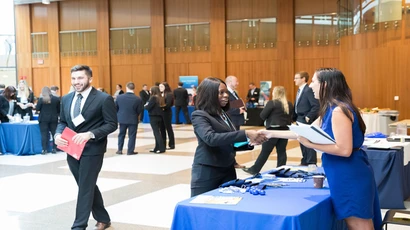Sample Interview Questions
- Tell me about yourself (your background, interests, etc.).
- Why do you feel you are qualified for this position?
- How would you describe yourself?
- What qualifications do you have that will make you successful in the field?
- What college subjects did you like best/least? Why?
- Do you think your grades are a good indication of your academic achievements?
- How much effort did you put into your course-work?
- Do you have plans for continued study? An advanced degree? Why?
- How has your college experience prepared you for a career?
- What have you learned from participation in extracurricular activities?
- What are your skills (i.e., leadership, organizational, interpersonal, language, technical, etc.)?
- Have you had previous experience in supervising a staff or other individuals?
- What is your supervisory and or management style?
- Describe the relationship that should exist between a supervisor and an employee.
- Why did you choose the career for which you are preparing? How did you choose it?
- In your present or last position, what aspects did you like the most/least?
- How would a previous employer, professor, or friend describe you?
- Why did you decide to seek a position with this organization?
- What do you know about our organization?
- What do you think it takes to be successful in an organization like ours?
- What contributions can you make to our organization?
- What do you consider to be your greatest strengths/weaknesses?
- What accomplishments have given you the most satisfaction? Why?
- How do you work under pressure?
- How do you handle criticism?
- Tell me about a situation where you had to convince someone to see your point of view.
- Talk about a situation where you had to deal with someone who was being difficult.
- Tell me about a time where you had a major disagreement with an employer and how you handled this.
- Describe a time when you had to deal with the public. Who was involved? What did you do? How did those involved respond?
- Tell me about your most challenging leadership role. What was your role in the group and what was the result?
- Give me an example of an important goal which you have set and tell me how you reached it. What steps did you take?
- Describe a situation that required you to do a number of things at the same time. How did you handle it? What was the result?
- Describe a situation where others you were working with disagreed with your ideas. What did you do?
- If you and another co-worker are working together and you end up doing a majority of the tasks and getting half of the credit, how would you handle it? What would you do?
- What are your long-range and short-range goals, personal and professional?
- What do you see yourself doing five/ten years from now?
- If you were hiring someone for this position, what qualities would you look for?
- What do you feel this position should pay?
- What additional information can you tell me, that we haven’t covered so far, that would make you the ideal candidate for this position?
- Why should we hire you?
- What questions do you have about this company, the position, or anything related?
Projecting a Professional Image
- You always want your skills and experience to be the focal points of your interview, not what you are wearing.
- Conservative is usually better.
- When in doubt, it is better to be overdressed than underdressed.
- Anytime you are giving out your resume, attending an organization presentation, or meeting with a contact in the industry, regardless of circumstances, business casual is a minimum.
- Once you are “in” the organization (i.e., you have the internship or job), then you can judge what is acceptable by the organization. Until then, follow the rules below.
Dressing for Interviews
The following are general guidelines for dressing appropriately for interviews. Different career fields may be more or less conservative so do your research.
Women
Do's
- Professional dark business suit (black, dark blue, grey).
- Minimal or conservative jewelry (small earrings, one ring not three, small necklace, etc.).
- Stockings/pantyhose are a must when wearing a skirt.
- Conservative make-up and nail polish (shy away from reds and pinks, stick with neutral colors).
- If possible, keep hair away from face.
- Skip the perfume or use sparingly.
- Bring a briefcase or portfolio (if needed).
Don'ts
- High hemline on skirt - the skirt should be only a few inches above the knee (anything higher looks unprofessional).
- Low-cut blouse. Blouses need to be buttoned up to the top or second to top button.
- Open-toed shoes.
Men
Do's
- Professional dark business suit (black, dark blue, grey).
- White shirts or solid blue is acceptable.
- Conservative ties (solid or small neat patterns). Silk ties usually best.
- Clean-shaven or facial hair neatly trimmed.
- Polished shoes that match/complement your suit.
- Skip the aftershave or use sparingly.
- If you choose to wear jewelry, limit it to a watch, ring and/or cuff-links.
- Bring a briefcase or portfolio (if needed).
Don'ts
- Bottom of necktie reaches beyond belt.
- Shoes with a worn or run-down heel.

